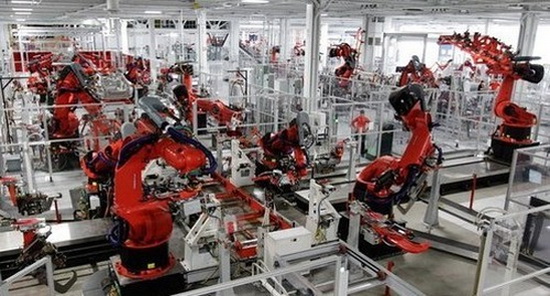


Physics graduate Niu Guangchong is pinning his career hopes on one day building a "robot kingdom".
The 24-year-old from northeast China's Jilin province recently turned down a much coveted graduate school offer from Jilin University to pursue his startup robot company.
So far he has made promising steps, assembling a team to design a nimble, spider-like robot controlled by a smartphone that may one day be used as a service tool on land, sea and air.
While Niu has placed his future on developing technology, the central and local government in China's northeast are anchoring the region's future on people like him.
As Heilongjiang, Jilin and Liaoning province are hit hard by economic slowdown, they are encouraging the young generation to go out and start businesses in hopes they can revive the once thriving region.
ECONOMIC MALAISE
Although mass entrepreneurship has been vigorously promoted across China, special attention has been attached to the northeastern region, whose traditional heavy industry has suffered acutely in modern times.
Of all 31 provinces, municipalities, regions on the Chinese mainland, the three provinces were among the four with the weakest economic expansion in the first half of 2015. A stunningly-low growth of 2.6 percent, compared with the national average of 7 percent, put Liaoning in last place.
During his trip to the region in mid-July, Chinese President Xi Jinping called for an innovation-backed economic growth model, encouraging a society-wide passion for innovation in order to revive the region known as the 'rustbelt'.
A cradle of New China's industry, the region gradually lost glory after the country's opening up. However, a 2003 plan brought a decade of turbocharged development thanks to supportive policies and increased demand for raw materials and heavy industrial products.
But in 2013, the region's economy began slacking once again as demand and investment declined as a result of the nationwide slowdown, which also pointed to the old industrial heartland's deep-rooted maladies of central-planning mentality and imbalanced economic structure.
Mass entrepreneurship and innovation will inspire the vigor of the market, boost private economy, and change the dominant role of sluggish state-owned companies, said Liu Shuming, a researcher with Jilin's provincial development research center. "It's a key to the old bases' rebirth."
CHANGE & CHALLENGE
In early July, 22 measures were announced to boost entrepreneurship and new industries in the northeast by the National Development and Reform Commission, the Ministry of Science and Technology, the Ministry of Human Resources and Social Security and the Chinese Academy of Sciences.
The measures require local governments to offer more financial support to startups and accelerate development of business incubators, as well as boost commercialization of research results.
Jilin took a step ahead by revealing its detailed plan in June, pledging to lift restrictions on registration of startup incubators and allow college students and researchers to establish businesses full-time without being expelled from the school or research institutes.
"The incubator offered us work space and other free services, as well as opportunities to get venture capital," Niu said. The team obtained 200,000 yuan (32,220 U.S. dollars) as startup capital from the Ministry of Human Resources and Social Security and is expecting social investors.
The 7,000-square-meter incubator, located near five universities in Jilin's capital Changchun, opened in December, 2014. It now accommodates 23 startups, including one that was listed on the New Third Board, a national share transfer system for small and medium-sized enterprises, in June, said Liu Chunsheng, found of the incubator.
"Here we consulted government officials and business insiders on policies and industry development, and had training on how to run a startup. That helped us go public quickly," said Wang Shuo, deputy general manager with Xuhai Technology, which helps clients in traditional industries to integrate their business with mobile Internet.
Liu said his mission is to bridge capital with good ideas. "When I started my business in Changchun many years ago, money was a big headache."
Such incubators have also thrived in big cities like Shenyang, Dalian and Harbin, signaling a growing passion for startups in the rustbelt.
Earlier this month, Heilongjiang authorities set up a company dedicated to offering loan guarantees for college entrepreneurs.
However, changes will not happen overnight. "It remains a question whether the supportive policies can really benefit entrepreneurs," said Xu Wenfang, a political advisor in Jilin.
In addition, bias against small and micro-sized enterprises are held by some officials, as well as young job seekers and their parents, Xu said.
A survey conducted by Jilin's provincial development and reform commission this year showed that most of local college students coveted steady jobs in government agencies and state-owned companies, while only 9.5 percent of them considered opening their own company.
Niu believes the path he chose was "less traveled, but more interesting."
 Shocking scenes found in 4000-year-old earthquake relic
Shocking scenes found in 4000-year-old earthquake relic Female soldiers add color to military parades
Female soldiers add color to military parades Taiwan campus belle with gorgeous look
Taiwan campus belle with gorgeous look  Stunning photos of China’s fighters and airborne troops
Stunning photos of China’s fighters and airborne troops Mums stage breastfeeding flash mob
Mums stage breastfeeding flash mob PLA South China Sea Fleet conducts live fire exercise
PLA South China Sea Fleet conducts live fire exercise Beauty of Tsinghua University transforms into car model
Beauty of Tsinghua University transforms into car model Official shot having sex with two college girls
Official shot having sex with two college girls Moscow “spider-man” climbs Chinese skyscraper
Moscow “spider-man” climbs Chinese skyscraper Fiery freezer
Fiery freezer Bearly getting along
Bearly getting along Top luxury firms struggling in China
Top luxury firms struggling in China Japan reads too much into WWII parade
Japan reads too much into WWII paradeDay|Week